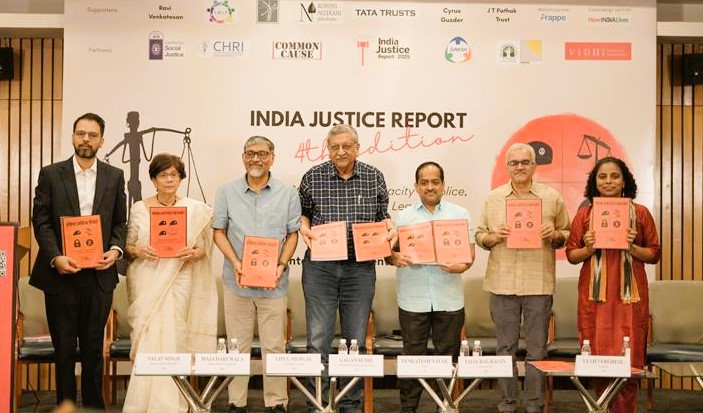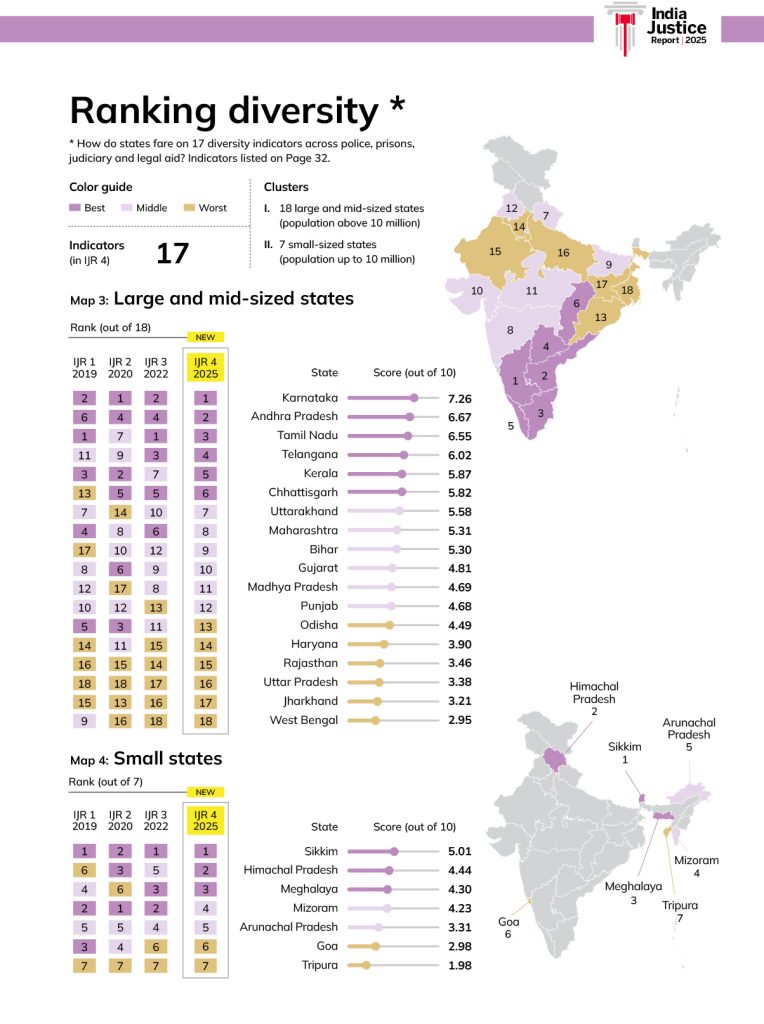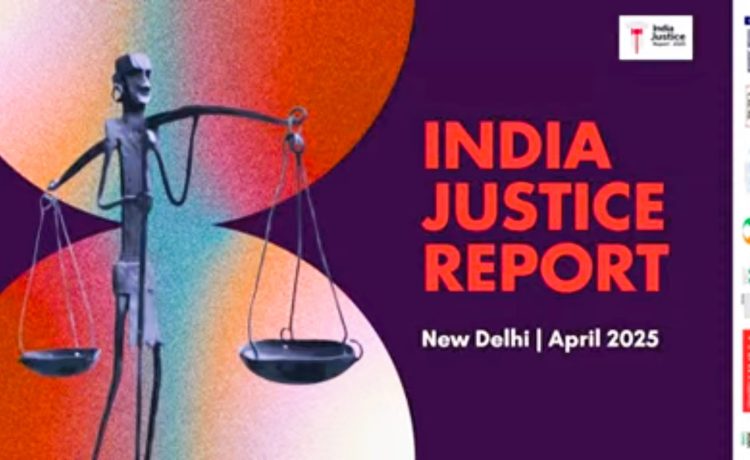Karnataka Tops India Justice Report 2025: Only State to Meet Police and Judiciary Quotas
Despite significant gaps in legal outreach and prison reforms, Karnataka leads justice delivery among large states
Bengaluru, 15 April, 2025 – Karnataka has once again secured the top spot in the India Justice Report (IJR) 2025, maintaining its position as the best-performing state in delivering justice among the 18 large and mid-sized states in India. This marks the second consecutive edition where the state has ranked first overall, backed by notable improvements in legal aid, reduced police vacancies, and increased diversity within the justice system.
The IJR 2025, India’s only comprehensive ranking of states on justice delivery, evaluates performance across four key pillars: Police, Judiciary, Prisons, and Legal Aid. Now in its fourth edition, the report is a result of a 24-month analysis of official government data, conducted by a consortium of civil society organisations and coordinated by Tata Trusts.

Karnataka’s Continued Dominance in Justice Delivery
Karnataka led in legal aid and retained high rankings in other pillars: second in prisons, third in police, and fourth in the judiciary. The state stands out as the only one to meet reservation quotas for Scheduled Castes, Scheduled Tribes, and Other Backward Classes in both the police and the judiciary.
Additionally, Karnataka recorded the lowest officer-level vacancies among all large states, with only 1.2% of sanctioned positions in the police left unfilled. It also reported the highest utilisation of police modernisation funds (98.5%) and ensured that 99% of police stations have women help desks.
“Reform is not optional. It is urgent,” said Maja Daruwala, Chief Editor of the India Justice Report. “A well-resourced, responsive justice system is a constitutional imperative that must be experienced as an everyday reality available to every citizen.”
Legal Aid: Paralegal Volunteer Network Expands Even as Clinics Decline
Karnataka ranked first in the legal aid pillar, countering a national trend of declining paralegal volunteers. The number of paralegal volunteers per lakh population increased from 4.9 in January 2019 to 7.59 in September 2024, the highest in the country. The state also leads in gender representation, with women comprising 44% of panel lawyers.
However, the number of legal service clinics in rural areas sharply declined—from 174 in 2021-22 to just 32 in 2023-24—raising concerns about access in underserved regions.
Judiciary: Increased Representation, Reduced Vacancies
Karnataka has made commendable strides in judicial appointments. It now fills 100% of reserved positions for SC, ST, and OBC judges in the district judiciary and has 37% women among district court judges. The state also reduced vacancies among district judges from 22% in 2022 to 16% in 2025, while staffing gaps in the High Court shrank from 26% to 17%.
Prisons: Better Infrastructure, But High Undertrial and Medical Vacancies
Despite having the highest proportion of women in prison staff (33%) and increasing video conferencing coverage in prisons from 68% to 93%, Karnataka faces persistent issues. Alarmingly, 80% of prisoners are undertrials, the highest proportion since 2015. Moreover, the prison system is grappling with significant medical vacancies—74% among medical officers and 64% among medical staff remain unfilled.

Persistent Gender Gaps in Policing
While Karnataka has advanced in many areas, gender diversity in policing remains a concern. Women comprise only 9% of the police force, and a mere 6% at the officer level. These numbers highlight the need for greater gender representation and inclusion in the state’s security apparatus.
National Trends: Bihar Shows Improvement Amid Persistent Challenges
Among other large states, Bihar made modest gains, climbing three spots to rank 13th overall. It improved in policing (from 16th to 10th) and legal aid (from 16th to 12th). However, Bihar continues to struggle with chronic underfunding—it has the lowest per capita expenditure on both police and judiciary. Additionally, 71% of its district court cases have been pending for over three years, the worst backlog rate in the country.
Justice System Reform: A National Imperative
The report underscores the urgent need for systemic reform across the country. Justice (Retd.) Madan B. Lokur remarked, “The punishing process of accessing justice begins with the very first encounter an individual has with the system… The burden continues to remain on the individual seeking justice, and not the state to provide it.”
The IJR 2025 recommends that justice delivery be designated as an essential service, calling for sustained investments in human resources, infrastructure, and inclusive policies to uphold the constitutional promise of equal justice for all.
✅ Short Summary

Karnataka tops the India Justice Report 2025 among large states, becoming the only state to meet SC/ST/OBC quotas in both police and judiciary. While the state shows strong performance in legal aid and police reforms, concerns persist over prison undertrial rates and gender gaps in policing. Bihar, though still underfunded, shows improvement in police and legal aid rankings. The report calls for urgent systemic reforms to make justice delivery an essential service.
🗣️ Key Statements & Quotes
Justice (Retd.) Madan B. Lokur:
“The burden continues to remain on the individual seeking justice, and not the state to provide it. That must change.”
Maja Daruwala, Chief Editor, IJR:
“The promise of rule of law will remain hollow unless underwritten by a reformed, resourced justice system.”
IJR Editorial Team Statement:
“Karnataka sets an example in equitable representation and modern policing, but the high number of undertrials remains a concern.”
❓Q & A
Q: Why is Karnataka ranked #1 in the India Justice Report 2025?
A: Karnataka leads due to low police vacancies, full implementation of caste-based reservations in judiciary and police, strong legal aid programs, and high fund utilization.
Q: What are the areas of concern for Karnataka?
A: 80% of its prison population comprises undertrials—the highest in the country—and gender representation in the police remains low.
Q: How did Bihar perform?
A: Bihar improved in police and legal aid rankings but continues to suffer from the lowest per capita justice expenditure and heavy case backlogs.
Q: What is the IJR’s major recommendation?
A: The report urges the designation of justice delivery as an essential service, emphasizing the need for urgent resource allocation and systemic reform.
#IndiaJusticeReport2025 #KarnatakaJustice #AccessToJustice #PoliceReform #JudicialReform #LegalAid #RuleOfLaw #JusticeForAll #PrisonReform #HumanRights #EssentialService
![]()











